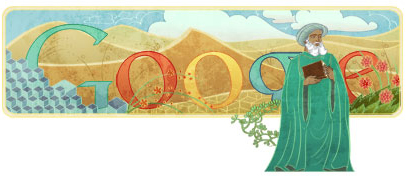كما عودتنا قوقل احتفلت بالامس بوضع شعار جديد لها عن ابن خلدون

He is indeed the one outstanding personality in the history of a civilization whose social life on the whole was 'solitary, poor, nasty, brutish and short'. In his chosen field of intellectual activity he appears to have been inspired by no predecessors, and to have found no kindred souls among his contemporaries, and to have kindled no answering spark of inspiration in any successors ; and yet, in the Prolegomena (Muqaddimat) to his Universal History he has conceived and formulated a philosophy of history which is undoubtedly the greatest work of its kind that has ever yet been created by any mind in any time or place. It was his single brief 'acquiescence' from a life of practical activity that gave Ibn Khaldun his opportunity to cast his creative thought into literary shape.
A STUDY OR HISTORY. Vol. III. Arnold ]. Toynbee. Royal Institute of International Affairs and Oxford University Press. p. 321-322.
INTRODUCTION:
Ibn Khaldun is the most important figure in the field of History and Sociology in Muslim History. He is one of those shining stars that contributed so richly to the understanding of Civilization. In order for one to understand and appreciate his work, one must understand his life. He lived a life in search of stability and influence. He came from a family of scholars and politicians and he intended to live up to both expectations. He would succeed in the field of Scholarship much more so than in any other field.

CHILDHOOD AND EARLY YEARS:
He is Abdurahman bin Muhammad bin Muhammad bin Muhammad bin Al-Hasan bin Jabir bin Muhammad bin Ibrahim bin Abdurahman bin Ibn Khaldun. His ancestry according to him originated from Hadramut, Yemen. He also traced his ancestry through another genealogy as supplied by Ibn Hazem using his grandfather who was the first to enter Andalusia back to Wail ibn Hajar one of the oldest Yemenite tribe. In either case, the genealogy points to his Arab origin although scholars do question the authenticity of both reports due to the political climate at the time of these reports.[1]
Ibn Khaldun was born in Tunis on Ramadan 1, 732 (May 27, 1332)[2]. He received a traditional education that was typical of his family’s rank and status. He learned first at the hands of his father who was a scholarly person who was not involved in politics like his ancestors. He memorized the Qur’an by heart, learned grammar, Jurisprudence, Hadith, rhetoric, philology, and poetry. He had reached certain proficiency in these subjects and received certification in them. In his autobiography, he does mention the names these scholars.[3]
He continued studies until the age of 19 when the great plague would sweep over the lands from Samarkand to Mauritania. It was after this plague that Ibn Khaldun would receive his first public assignment.[4] This would start his political career that would forever change his life.

He is indeed the one outstanding personality in the history of a civilization whose social life on the whole was 'solitary, poor, nasty, brutish and short'. In his chosen field of intellectual activity he appears to have been inspired by no predecessors, and to have found no kindred souls among his contemporaries, and to have kindled no answering spark of inspiration in any successors ; and yet, in the Prolegomena (Muqaddimat) to his Universal History he has conceived and formulated a philosophy of history which is undoubtedly the greatest work of its kind that has ever yet been created by any mind in any time or place. It was his single brief 'acquiescence' from a life of practical activity that gave Ibn Khaldun his opportunity to cast his creative thought into literary shape.
A STUDY OR HISTORY. Vol. III. Arnold ]. Toynbee. Royal Institute of International Affairs and Oxford University Press. p. 321-322.
INTRODUCTION:
Ibn Khaldun is the most important figure in the field of History and Sociology in Muslim History. He is one of those shining stars that contributed so richly to the understanding of Civilization. In order for one to understand and appreciate his work, one must understand his life. He lived a life in search of stability and influence. He came from a family of scholars and politicians and he intended to live up to both expectations. He would succeed in the field of Scholarship much more so than in any other field.

CHILDHOOD AND EARLY YEARS:
He is Abdurahman bin Muhammad bin Muhammad bin Muhammad bin Al-Hasan bin Jabir bin Muhammad bin Ibrahim bin Abdurahman bin Ibn Khaldun. His ancestry according to him originated from Hadramut, Yemen. He also traced his ancestry through another genealogy as supplied by Ibn Hazem using his grandfather who was the first to enter Andalusia back to Wail ibn Hajar one of the oldest Yemenite tribe. In either case, the genealogy points to his Arab origin although scholars do question the authenticity of both reports due to the political climate at the time of these reports.[1]
Ibn Khaldun was born in Tunis on Ramadan 1, 732 (May 27, 1332)[2]. He received a traditional education that was typical of his family’s rank and status. He learned first at the hands of his father who was a scholarly person who was not involved in politics like his ancestors. He memorized the Qur’an by heart, learned grammar, Jurisprudence, Hadith, rhetoric, philology, and poetry. He had reached certain proficiency in these subjects and received certification in them. In his autobiography, he does mention the names these scholars.[3]
He continued studies until the age of 19 when the great plague would sweep over the lands from Samarkand to Mauritania. It was after this plague that Ibn Khaldun would receive his first public assignment.[4] This would start his political career that would forever change his life.

 الرئيسية
الرئيسية






